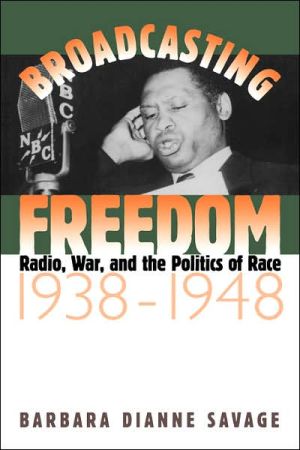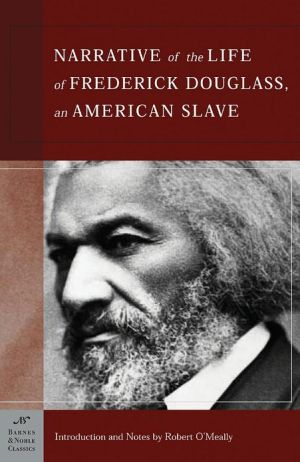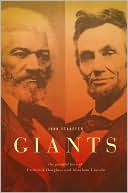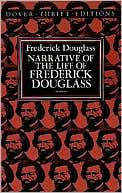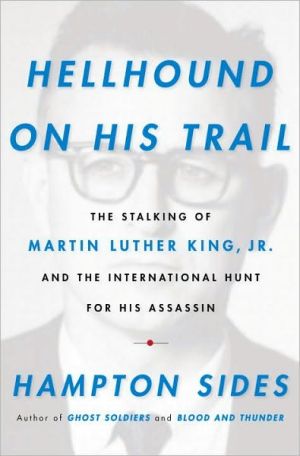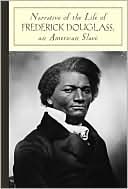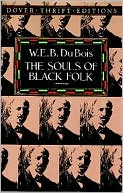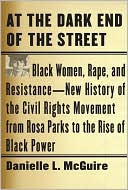Broadcasting Freedom: Radio War and the Politics of Race, 1938-1948
The World War II era represented the golden age of radio as a broadcast medium in the United States; it also witnessed a rise in African American activism against racial segregation and discrimination, especially as they were practiced by the federal government itself. In Broadcasting Freedom, Barbara Savage links these cultural and political forces by showing how African American activists, public officials, intellectuals, and artists sought to access and use radio to influence a national...
Search in google:
Recovers the importance of 1940s radio to the quest for racial equality in America. The public programming campaigns of activists, government officials, and intellectual leaders heightened awareness of racial issues and helped start the civil rights campaign of the 1950s and 1960s.Library JournalAs the first national mass medium, radio emerged as a forum for debating racial injustice. Savage (history, Univ. of Pennsylvania) focuses on national public affairs programming from 1938 to 1948 and explores the interactions of radio, race, and politics. Tracing the origins, content, and reception of selected programs, Savage reveals the battle lines and hardworking heroes of the struggle to assure blacks a popularly accessible and politically acceptable place in the discourse of U.S. history and culture. Her deft treatment of the activists, programming, public policies, and symbolic politics broadens views of the Civil Rights movement of the 1950s and 1960s and pioneers new scholarship in radios rich but virtually ignored historical role. Savages work complements Melvin Patrick Elys The Adventures of Amos N Andy: A Social History of an American Phenomenon (Free Pr., 1991. o.p.), Herman Grays Watching Race: Television and the Struggle for Blackness (Univ. of Minnesota, 1995), and Sasha Torress Living Color: Race and Television in the United States (Duke Univ., 1998). Highly recommended.Thomas J. Davis, Arizona State Univ., Tempe
AcknowledgmentsIntroduction1Pt. IFederal Constructions of "the Negro"1Americans All, Immigrants All: Cultural Pluralism and Americanness212Freedom's People: Radio and the Political Uses of African American Culture and History633"Negro Morale," the Office of War Information, and the War Department106Pt. IIAiring the Race Question4The National Urban League on the Radio1575Radio and the Political Discourse of Racial Equality1946New World A'Coming and Destination Freedom246Conclusion271AppRadio Programs Discussed in the Text279Notes283Bibliography357Index377
\ From the PublisherA brilliant and provocative book.\ American Historical Review\ A study of great value to scholars of black history, communications, propaganda, and mid-century America.\ The Historian\ Savage has done a superb job.\ Journal of Southern History\ This extraordinary book will help shape the way we think about both [civil rights and the development of radio].\ Journal of American History\ Clearly organized and well written.\ Choice\ \ \ \ \ \ Library JournalAs the first national mass medium, radio emerged as a forum for debating racial injustice. Savage (history, Univ. of Pennsylvania) focuses on national public affairs programming from 1938 to 1948 and explores the interactions of radio, race, and politics. Tracing the origins, content, and reception of selected programs, Savage reveals the battle lines and hardworking heroes of the struggle to assure blacks a popularly accessible and politically acceptable place in the discourse of U.S. history and culture. Her deft treatment of the activists, programming, public policies, and symbolic politics broadens views of the Civil Rights movement of the 1950s and 1960s and pioneers new scholarship in radios rich but virtually ignored historical role. Savages work complements Melvin Patrick Elys The Adventures of Amos N Andy: A Social History of an American Phenomenon (Free Pr., 1991. o.p.), Herman Grays Watching Race: Television and the Struggle for Blackness (Univ. of Minnesota, 1995), and Sasha Torress Living Color: Race and Television in the United States (Duke Univ., 1998). Highly recommended.Thomas J. Davis, Arizona State Univ., Tempe\ \
